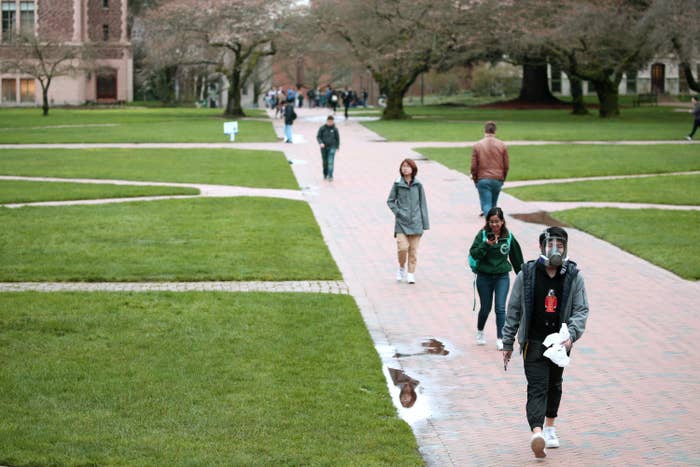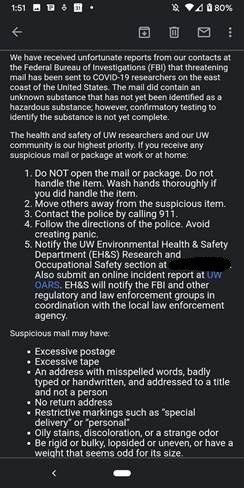
The journalists at BuzzFeed News are proud to bring you trustworthy and relevant reporting about the coronavirus. To help keep this news free, become a member and sign up for our newsletter, Incoming.
Hundreds of researchers at the University of Washington have been warned to watch out for suspicious mail after the FBI informed the school that a suspicious package was sent to coronavirus scientists elsewhere.
In a Monday email obtained by BuzzFeed News, the university cited the FBI and cautioned that “threatening mail has been sent to COVID-19 researchers on the east coast” containing an “unknown substance” that the bureau was testing to determine if it was hazardous. The email, which was sent to about 500 researchers in the biological sciences, advised staff to watch out for suspect packages, including any with “oily stains, discoloration, or a strange odor.”
An FBI spokesperson confirmed that the bureau, “along with our local law enforcement partners, responded to a suspicious package sent to a few university researchers.” The spokesperson added that “preliminary testing has indicated there is no threat to public safety in connection with this mailing.”
The warning comes at a time when the coronavirus pandemic has become dangerously politicized, with top scientists such as Dr. Anthony Fauci receiving death threats, conspiracy theories about the virus’s origins circulating widely, people taking to the streets to protest lockdowns, and the internet deluged with reports of people reacting violently when asked to wear masks in stores and airplanes.
If you have any information about the package, or are aware of other incidents involving suspicious mail being sent to COVID-19 researchers, please contact these reporters at ken.bensinger@buzzfeed.com or jason.leopold@buzzfeed.com. You can also pass information on to BuzzFeed News securely and anonymously through a variety of means by following this link.
Deadly packages sent through the mail can be particularly hard to trace. The Unabomber, Ted Kaczynski, mailed bombs to a variety of people including academics over a 17-year period, killing 3 and injuring more than 20, before he was finally apprehended in 1996. After the Sept. 11 terrorist attacks, anthrax was sent through the mail, killing five and causing 17 others to get sick. It took the FBI almost nine years to close the investigation, naming Bruce Ivins, a government scientist who killed himself before charges were filed, as the perpetrator. Doubts still linger about whether the true culprit was found.
In the current situation, the FBI declined to provide further details about the suspicious mail, including which researchers and institutions received it, whether there was a single or multiple packages, when the bureau was notified, what exactly the package or packages contained, what the motive could be, or whether a suspect had been identified.
It also declined to state whether it had contacted other universities about the risk, but said that it encourages “the public to remain vigilant and report any suspicious activity to law enforcement.”
In its Aug. 31 email to staff, the University of Washington’s Environmental Health and Safety department advised faculty to look out for suspicious packages, including those with “excessive postage,” “excessive tape,” “oily stains, discoloration, or a strange odor” or “no return address.” A university spokesperson said she was not aware of any employees receiving suspicious mail to date.

UW has established itself as one of the nation’s leading centers of research on the deadly pandemic. Researchers at the Seattle-based university are currently conducting at least 16 clinical studies on the virus, in addition to numerous other research projects. The school also houses a research organization that has produced some of the direst forecasts on the expected COVID death toll.
But it is hardly the only institution researching the deadly pathogen. There are currently almost 700 clinical studies being conducted at the nation’s universities, public health agencies, nonprofits, and private corporations.
BuzzFeed News reached out to several other universities and scientists active in coronavirus research across the country, but was unable to identify incidents of suspicious mail being received by any research faculty. A professor working on COVID-19 at Columbia University, for example, said that although she’d received nasty emails and DMs on Twitter, no threatening physical mail had come to her or her lab.
A spokesperson for the National Institutes of Health, where Dr. Fauci directs the National Institute of Allergy and Infectious Diseases, referred a query back to the FBI, which declined to provide additional information beyond its original statement.
Stephanie M. Lee, Dan Vergano, and Peter Aldhous contributed reporting.

